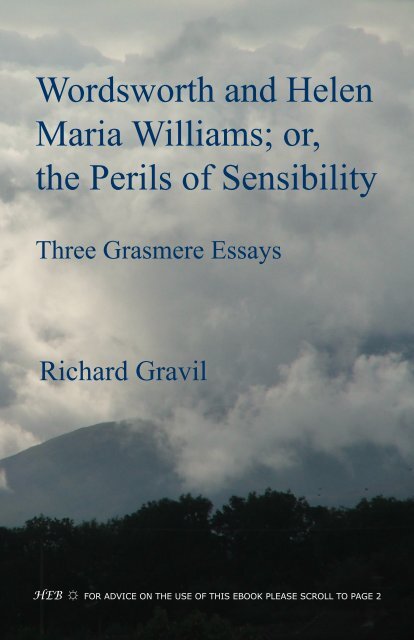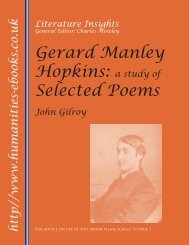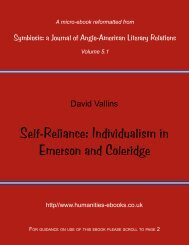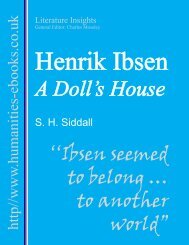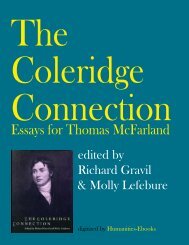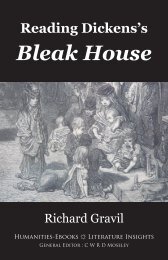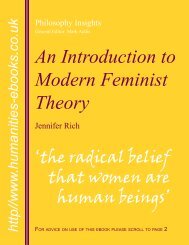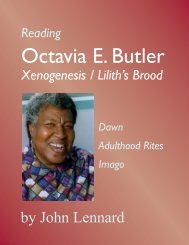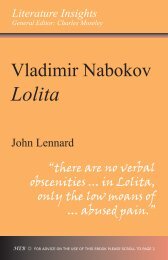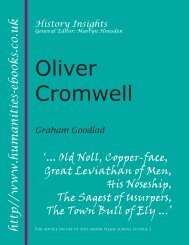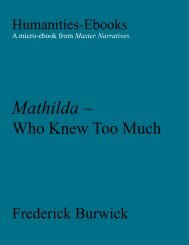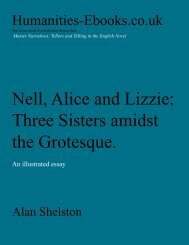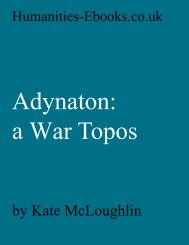Wordsworth and Helen Maria Williams; or, the Perils of Sensibility
Wordsworth and Helen Maria Williams; or, the Perils of Sensibility
Wordsworth and Helen Maria Williams; or, the Perils of Sensibility
Create successful ePaper yourself
Turn your PDF publications into a flip-book with our unique Google optimized e-Paper software.
<strong>W<strong>or</strong>dsw<strong>or</strong>th</strong> <strong>and</strong> <strong>Helen</strong><br />
<strong>Maria</strong> <strong>Williams</strong>; <strong>or</strong>,<br />
<strong>the</strong> <strong>Perils</strong> <strong>of</strong> <strong>Sensibility</strong><br />
Three Grasmere Essays<br />
Richard Gravil<br />
HEB ☼ FOR ADVICE ON THE USE OF THIS EBOOK PLEASE SCROLL TO PAGE 2
To Buy This Book<br />
If this is what you are looking f<strong>or</strong> please<br />
Buy this Book<br />
<strong>or</strong><br />
Browse our lists<br />
Pdf Ebook Features:<br />
elegantly f<strong>or</strong>matted<br />
fixed page f<strong>or</strong>mats are easily cited<br />
high quality graphics<br />
internal <strong>and</strong> external hyperlinks<br />
easy navigation by bookmarks<br />
ideal f<strong>or</strong> laptops, desktops <strong>and</strong> tablets<br />
The book is yours to keep - <strong>and</strong> a copy is st<strong>or</strong>ed on<br />
your bookshelf in case you lose it.<br />
We also sell:<br />
Kindle editions from Amazon.com <strong>and</strong> Amazon.co.uk<br />
Paperbacks from Lulu.com <strong>and</strong> Troubad<strong>or</strong>.co.uk<br />
Library Editions from MyiLibrary <strong>and</strong> EBSCO
<strong>W<strong>or</strong>dsw<strong>or</strong>th</strong> <strong>and</strong> <strong>Helen</strong><br />
<strong>Maria</strong> <strong>Williams</strong>; <strong>or</strong>,<br />
<strong>the</strong> <strong>Perils</strong> <strong>of</strong> <strong>Sensibility</strong><br />
Three Grasmere Essays<br />
Richard Gravil<br />
HEB ☼ Humanities-Ebooks, 2010
© Richard Gravil, 2010<br />
The Auth<strong>or</strong> has asserted his right to be identified as <strong>the</strong> auth<strong>or</strong> <strong>of</strong> this W<strong>or</strong>k in<br />
acc<strong>or</strong>dance with <strong>the</strong> Copyright, Designs <strong>and</strong> Patents Act 1988.<br />
First published by Humanities-Ebooks, LLP,<br />
Tirril Hall, Tirril, Penrith CA10 2JE<br />
The Ebook (with <strong>the</strong> facility <strong>of</strong> w<strong>or</strong>d <strong>and</strong> phrase search) is available exclusively<br />
from http://www.humanities-ebooks.co.uk<br />
The paperback is available from Lulu.com<br />
ISBN 978-1-84760-094-3 Ebook<br />
ISBN 978-1-84760-095-0 Paperback
Contents<br />
Preface 8<br />
Introduction: <strong>Williams</strong> <strong>and</strong> <strong>W<strong>or</strong>dsw<strong>or</strong>th</strong>, an Odyssey 11<br />
1. <strong>W<strong>or</strong>dsw<strong>or</strong>th</strong>’s Revolutionary Anima 16<br />
‘A Region <strong>of</strong> Romance’ 16<br />
‘Domestic carnage’ 30<br />
‘Come now, ye golden times’ 33<br />
2. An Affair <strong>of</strong> <strong>Sensibility</strong> 41<br />
Twilight Tears 41<br />
Affective elements in The Prelude 56<br />
A language f<strong>or</strong> <strong>the</strong> sense <strong>of</strong> aftermath 59<br />
<strong>W<strong>or</strong>dsw<strong>or</strong>th</strong> <strong>and</strong> <strong>the</strong> <strong>Sensibility</strong> Sonnet 65<br />
3. <strong>W<strong>or</strong>dsw<strong>or</strong>th</strong> (Fox) <strong>and</strong> Jeffrey: ‘Namby-Pamby’, <strong>or</strong> <br />
<strong>the</strong> Shock <strong>of</strong> <strong>the</strong> New? 73<br />
Poems, in Two Volumes <strong>and</strong> Charles James Fox 73<br />
Francis Jeffrey on <strong>W<strong>or</strong>dsw<strong>or</strong>th</strong> 81<br />
<strong>W<strong>or</strong>dsw<strong>or</strong>th</strong> Unmanned; <strong>or</strong>, <strong>the</strong> cost <strong>of</strong> criticism 100<br />
<strong>Helen</strong> <strong>Maria</strong> <strong>Williams</strong>: a Select Bibliography 109<br />
Appendix: Textual Echoes 111
Preface<br />
The chapters in this volume are developed from lectures given at<br />
<strong>the</strong> <strong>W<strong>or</strong>dsw<strong>or</strong>th</strong> Summer Conference <strong>and</strong> Winter School in 2007<br />
<strong>and</strong> 2008. The talks were not initially conceived as a series, <strong>and</strong> <strong>the</strong><br />
three chapters might have appeared in any <strong>or</strong>der. It would have made<br />
sense to begin with <strong>Helen</strong> <strong>Maria</strong> <strong>Williams</strong>’s earliest influence on<br />
William <strong>W<strong>or</strong>dsw<strong>or</strong>th</strong>, <strong>the</strong>n look in detail at <strong>the</strong> relationship between<br />
<strong>the</strong>ir accounts <strong>of</strong> <strong>the</strong> French Revolution, <strong>and</strong> close by glancing at <strong>the</strong><br />
damage done to his critical reputation by his liaison dangereux with<br />
feminine sensibility as demonstrated in Poems in Two Volumes. Or I<br />
could have opened with <strong>the</strong> celebrated matter <strong>of</strong> Jeffrey’s h<strong>and</strong>ling<br />
<strong>of</strong> both Lyrical Ballads <strong>and</strong> <strong>the</strong> Poems in Two Volumes <strong>and</strong> <strong>the</strong>n considered<br />
what it was in <strong>W<strong>or</strong>dsw<strong>or</strong>th</strong>’s poetic allegiances that tempted<br />
him to betray so much ‘feminine’ sensibility in his ‘Pansies’ as one<br />
might call <strong>the</strong>m, <strong>and</strong> why <strong>the</strong> impact <strong>of</strong> so much sensibility had <strong>the</strong><br />
effect <strong>of</strong> thrusting <strong>the</strong> admitted ‘manliness’ <strong>of</strong> <strong>the</strong> political sonnets<br />
into <strong>the</strong> background.<br />
It seemed, on balance, best to open with <strong>the</strong> gr<strong>and</strong> hist<strong>or</strong>ical topos<br />
<strong>of</strong> ‘human nature seeming b<strong>or</strong>n again’, as encountered first by a<br />
female hist<strong>or</strong>ian <strong>and</strong> <strong>the</strong>n a male poet; to go on by examining o<strong>the</strong>r<br />
traces <strong>of</strong> <strong>the</strong> f<strong>or</strong>mer’s w<strong>or</strong>k <strong>and</strong> sensibility to be found in <strong>the</strong> latter;<br />
<strong>and</strong> to conclude (with what was, in fact <strong>the</strong> first lecture) by wondering<br />
whe<strong>the</strong>r it was <strong>the</strong>se traces <strong>of</strong> ‘feminine’ sensibility, <strong>or</strong> ‘effeminacy’,<br />
by <strong>the</strong> st<strong>and</strong>ards <strong>of</strong> <strong>the</strong> day, that drew down upon one hapless<br />
lake poet <strong>the</strong> sc<strong>or</strong>n <strong>of</strong> Edinburgh. Complete reconstruction <strong>of</strong><br />
<strong>the</strong> approach in <strong>the</strong> first two chapters proved to be beyond my skill,<br />
so <strong>the</strong> chapters do treat some elements <strong>of</strong> <strong>the</strong> st<strong>or</strong>y <strong>of</strong> <strong>W<strong>or</strong>dsw<strong>or</strong>th</strong><br />
<strong>and</strong> <strong>Williams</strong>, especially as regards <strong>the</strong>ir experience <strong>of</strong> France, twice<br />
over, though with different emphases.<br />
The package is, to my mind, held toge<strong>the</strong>r by this matter <strong>of</strong> (as I<br />
would have it) ungendered poetic sensibility. Apart from anything
<strong>W<strong>or</strong>dsw<strong>or</strong>th</strong> <strong>and</strong> <strong>Sensibility</strong> 9<br />
<strong>of</strong> value that I might be found to be saying about <strong>W<strong>or</strong>dsw<strong>or</strong>th</strong> <strong>and</strong><br />
<strong>Williams</strong>, <strong>or</strong> indeed <strong>W<strong>or</strong>dsw<strong>or</strong>th</strong> <strong>and</strong> Jeffrey, <strong>the</strong> one thing I would<br />
most like to register is <strong>the</strong> wrongness <strong>of</strong> Coleridge’s famous assertion<br />
that <strong>W<strong>or</strong>dsw<strong>or</strong>th</strong>’s personality was entirely masculine—that <strong>the</strong>re<br />
was nothing feminine in his nature.<br />
Parts <strong>of</strong> chapter 1 are making <strong>the</strong>ir fourth appearance. A version<br />
<strong>of</strong> it was published in The <strong>W<strong>or</strong>dsw<strong>or</strong>th</strong> Circle, 40:1 (Winter 2009),<br />
<strong>and</strong> in it I drew on an article first published in 1989, in <strong>the</strong> French<br />
Revolution volume <strong>of</strong> <strong>the</strong> Yearbook <strong>of</strong> English Studies, edited by<br />
J. R. Watson, which Stephen Gill has also seen fit to resurrect in his<br />
Oxf<strong>or</strong>d ‘Casebooks in Criticism’ collection on The Prelude (2006).<br />
But I have avoided <strong>the</strong> temptation to draw too much upon a relevant<br />
chapter on ‘“The Milder day”: <strong>or</strong>, Manliness <strong>and</strong> Minstrelsy’ in<br />
<strong>W<strong>or</strong>dsw<strong>or</strong>th</strong>’s Bardic Vocation (2003).
<strong>Helen</strong> <strong>Maria</strong> <strong>Williams</strong>, by Ozias Humphrey, 1792
Introduction: <strong>Williams</strong> <strong>and</strong> <strong>W<strong>or</strong>dsw<strong>or</strong>th</strong>, an<br />
Odyssey<br />
While still a schoolboy, William <strong>W<strong>or</strong>dsw<strong>or</strong>th</strong>, as most <strong>W<strong>or</strong>dsw<strong>or</strong>th</strong>ians<br />
know, was already somewhat enamoured <strong>of</strong> <strong>Helen</strong> <strong>Maria</strong> <strong>Williams</strong>.<br />
He expressed his admiration f<strong>or</strong> <strong>the</strong> poet <strong>and</strong> her sensibility in his first<br />
published poem—Sonnet on seeing Miss <strong>Helen</strong> <strong>Maria</strong> <strong>Williams</strong> weep<br />
at a tale <strong>of</strong> distress—on which poem <strong>and</strong> its significance, I will dilate<br />
briefly in Chapter 2. Their st<strong>or</strong>ies are considerably m<strong>or</strong>e intertwined<br />
than that, however. This little book will argue that <strong>Williams</strong>’s w<strong>or</strong>k<br />
had a greater influence on <strong>W<strong>or</strong>dsw<strong>or</strong>th</strong>’s poetical development than<br />
she is generally given credit f<strong>or</strong>, <strong>and</strong> that <strong>W<strong>or</strong>dsw<strong>or</strong>th</strong>’s loyalty to <strong>the</strong><br />
kind <strong>of</strong> writing her Poems in Two Volumes (1786) helped to inspire in<br />
him is one <strong>of</strong> <strong>the</strong> primary reasons f<strong>or</strong> <strong>the</strong> acrimonious reception <strong>of</strong> his<br />
own Poems, in Two Volumes (1807). It will also claim that her w<strong>or</strong>k<br />
is a maj<strong>or</strong>, if not <strong>the</strong> maj<strong>or</strong>, influence on <strong>the</strong> great poem <strong>of</strong> <strong>the</strong> nineteenth<br />
century, The Prelude. In sh<strong>or</strong>t, while this book has no discoveries<br />
to announce about <strong>the</strong>ir connections, it does seek to re-assess<br />
<strong>the</strong> significance <strong>of</strong> <strong>Williams</strong> to <strong>W<strong>or</strong>dsw<strong>or</strong>th</strong>, both as a poet <strong>of</strong> <strong>the</strong> Age<br />
<strong>of</strong> <strong>Sensibility</strong>, <strong>and</strong> as a writer <strong>of</strong> a compendiouis eye-witness hist<strong>or</strong>y<br />
<strong>of</strong> <strong>the</strong> great event <strong>of</strong> <strong>the</strong> age, an event f<strong>or</strong>mative in both <strong>of</strong> <strong>the</strong>ir lives.<br />
On 13 July 1790, as all <strong>W<strong>or</strong>dsw<strong>or</strong>th</strong>ians know, <strong>W<strong>or</strong>dsw<strong>or</strong>th</strong><br />
<strong>and</strong> Robert Jones arrived in Calais ‘on <strong>the</strong> eve <strong>of</strong> that great federal<br />
day’, <strong>the</strong> festival that was to mark <strong>the</strong> first anniversary <strong>of</strong> <strong>the</strong><br />
French Revolution. <strong>Helen</strong> <strong>Maria</strong> <strong>Williams</strong>, on that day, was already<br />
in Paris. Indeed she had a gr<strong>and</strong>-st<strong>and</strong> seat in <strong>the</strong> Champ de Mars,<br />
to witness what she called ‘<strong>the</strong> most sublime spectacle which, perhaps,<br />
was ever represented on <strong>the</strong> <strong>the</strong>atre <strong>of</strong> this earth’. Her description<br />
<strong>of</strong> Louis XIV <strong>and</strong> 600,000 spectat<strong>or</strong>s saying <strong>the</strong> national oath<br />
toge<strong>the</strong>r begins <strong>the</strong> first <strong>of</strong> some fifteen volumes <strong>of</strong> contemp<strong>or</strong>ary<br />
hist<strong>or</strong>y, volumes that would be cannibalized repeatedly, in <strong>the</strong> three


